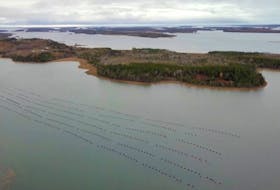EDITOR'S NOTE: This is the fifth story in a five-part series. In Part 5, we examine Atlantic Canada's future in technology and innovation.

It can’t be done here.
For decades, that’s what sceptics would say as they quietly doubted plans to create a tech sector in Atlantic Canada.
Leave the innovation to Silicon Valley, Waterloo and big cities, some said. Stick to tourism, services and natural resources like fisheries, forestry and agriculture.
But the homegrown success of tech firms like Fredericton’s Radian6, Halifax’s GoInstant, St. John’s Verafin and Charlottetown’s BioVectra has changed the conversation.
Atlantic Canada is firmly on the innovation map, experts say, with tech “ecosystems” emerging across the region.
The new wave of economic development appears to be more entrepreneur-led and hinges on connecting startups to established companies, researchers, the education sector and government.
Big tech, rural setting


“It’s economic development but private sector led as opposed to government led,” Rory Francis, executive director of the P.E.I. BioAlliance, said of his organization.
"We’re looking at the whole ecosystem ... all the factors that matter if you’re going to create the conditions for a technology-driven sector to thrive in a more rural part of Canada.”
Francis added: “We're defying gravity in that sense by looking at what it takes to create the innovation ecosystem that allows businesses to succeed in tech sectors like bioscience and making it happen here.”
Industry insiders are now angling to make the region a technology powerhouse, in part by focusing on what we’ve historically done best: Natural resources.
The idea is to use tech to modernize traditional industries like farming, fisheries, mining, forestry and energy to increase efficiency, productivity, environmental sustainability and profitability.
"It’s about embedding tech in other sectors of the economy,” said Paul Preston, chief executive officer of the Newfoundland and Labrador Association of Technology and Innovation.
“There is going to be a big focus on AI (artificial intelligence) and machine learning … and using AI for traditional business problems.”
Old industries, modern solutions


He pointed to Icewater Seafoods, a fish processing plant in Arnold’s Cove on the Avalon Peninsula.
The company invested $10 million to modernize its plant with robotics and tech automation, an investment that increased the workforce to 215 from 175.
“Too often we think automation in tech is going to mean jobs displaced,” Preston said. “But when you compete more and better globally, you get more jobs here locally.”
The so-called digitization of natural resources could improve everything from resource management to environmental sustainability while also spurring economic benefits, experts say.
Canada’s Ocean Supercluster, for example, plans to double the number of ocean start-ups in five years while creating 3,000 jobs and adding $14 billion to the economy in a decade.
"We’re focused on digitizing the ocean,” said Kendra MacDonald, CEO of Canada's Ocean Supercluster. "It's about bringing technology and digital solutions … to the ocean.”
She said the ocean sector has the potential to grow “by leaps and bounds.”
“The more we embrace this, I think truly the sky's the limit in terms of what the technology allows us to do,” MacDonald said.
She added that it’s "not about falling in love with the technology itself” but rather solving business problems with technology solutions.
Innovation with applications

Cathy Simpson, CEO of TechImpact, said the New Brunswick-based organization is focused on “applied innovation" across Atlantic Canada.
“We think of applied innovation as uncovering real problems within an industry and building technology-based solutions that result in IP (intellectual properties) that creates new exportable solutions,” she said in an email.
“We need to be more focused on digital transformation for all business sectors. We need to think big and be creating companies that can scale.”
Meanwhile, Jesse Rodgers, CEO of Volta Labs, said the tech sector in Atlantic Canada is reaching a critical mass.
“What’s changing is people are starting to believe those opportunities are here," he said. “There's a new confidence, a shift from thinking of ourselves as just small little Halifax.”
Rodgers said the new decade will see more local startups reach the stage of having 100 or more employees.
“People don’t feel trapped or like they have to go to Toronto to be successful in tech. You can do it here.”
More on the decade ahead:









